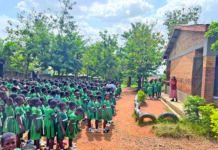
LAWRENCE — The consequences of parental substance abuse for children and communities can go far beyond a temporary intervention by social services. University of Kansas researchers are part of a grant project that will work to support Native American parents and children at risk of entering or in the child welfare system with an evidence-backed, culturally adapted parenting skills training program.
The Kansas Serves Native American Families program is a $3 million, five-year collaborative partnership between KU’s School of Social Welfare and social services at Prairie Band Potawatomi Nation, Sac and Fox Nation, Iowa Tribe of Kansas and Nebraska and potentially Kickapoo Tribe in Kansas. Other partners include Haskell Indian Nations University, KVC Kansas, the Kansas Department for Children and Families, Kansas Department for Aging and Disability Services, Kansas Native American Affairs Office and the Administration for Children and Families Region VII. Ultimately, the program will serve nearly 270 families through the life of the grant.
The partnership will serve families located on reservations and in urban areas throughout Kansas. Children from birth to age 18 who have been removed from the home due to parental substance abuse, or who are at risk of being removed, will take part in an intervention along with their parents known as the Strengthening Families Program. KVC staff and Haskell and KU students will deliver the 16-week program in five sites across the state. Researchers will work with tribal elders and community members to identify customs and strategies that will make the program as effective and culturally relevant as possible.
“This grant is part of a national evaluation to learn what works for families affected by substances,” said Susana Mariscal, research project director at KU’s School of Social Welfare and project director. “Our work will help inform this important area. Families that live on reservations often live in rural areas and weren’t able to be included in previous rounds of research. That motivated us to focus on this population and how we can support them.”
A higher percentage of Native American children — 52.5 percent — enters the Kansas foster care system due to parental substance use, compared with the overall population — 44.4 percent. Work has begun to adapt the program specifically to Native families and address the challenges present to implementing the program. They will also work with local partners to ensure the program is sustainable and the Strengthening Families Program can be delivered to families by local professionals and volunteers after the federal funding has ended.
“We’ve found that this program offers a good chance of sustainability, and we’re learning from our partners their values and what they need,” Mariscal said. “For example, many parents don’t have transportation, so our partners are identifying solutions to this problem, to be able to get them to the implementation sites and to solve other emerging problems.”
Each session of the Strengthening Families Program brings parents and children together for regular meals. During the session, families not only get to spend time together, but parents and children both get lessons on specific skills, such as communication and problem solving based on the week’s themes. The program focuses on family bonding, communication and parental supervision and equips parents with strategies to improve parenting and children with resilience-building skills while also measuring child and parental well-being.
“I am really excited about this program because it’s going to help and it’s tailored toward our community, our culture and our ways,” said Keirsten Hale, social services director at Prairie Band Potawatomi Nation.
“For parents whose children may be in foster care, this is an opportunity for them to spend time together while learning valuable lessons about parenting and strengthening their family bonds,” said Michelle Levy, research associate at KU’s School of Social Welfare and project evaluator.
Supporting these families has numerous benefits beyond preventing out-of-home placement or getting children and parents back in the same household. Children affected by parental substance use tend to suffer more physical, sexual or emotional maltreatment than their peers; they are also four times more likely to be neglected. After experiencing traumatic events, children may suffer many long-term negative outcomes such as cognitive, physical, behavioral and mental health problems, difficulty in school and potential substance abuse. In addition, supporting these families is cost-effective, because this initiative seeks to prevent the consequences previously mentioned, prevent further maltreatment and reduce the number of children in foster care, saving taxpayer money and preventing potential lifelong consequences. The program focuses on improving child well-being, safety and permanency as well as parent well-being and family stability to ensure positive outcomes.
“We are so honored to be working with these partners on a program we have seen have a major impact on children and families over the last 10 years in our Kansas communities. We have seen this program be implemented with success across the country, and it is an invaluable opportunity to adapt a program to meet community-specific needs while still maintaining Strengthening Families as an evidence-based intervention,” said Lindsey Stephenson, vice president of KVC Kansas.
Child welfare agencies, behavioral health centers, courts, tribal health and social services and other community agencies can all refer families for the program.
“Just knowing there were many families who could use our support and that there are likely more kids who weren’t being served really motivated us to seek out this grant and to engage our outstanding partners who can help us achieve these goals and serve families,” Mariscal said. “Every parent knows children don’t come with instructions. We all have our struggles with parenting. We seek to develop skills among these families and to strengthen them, increasing their likelihood of reunification and their resilience, decreasing their risk of re-entry or further maltreatment and improving their family functioning and their overall well-being.”




